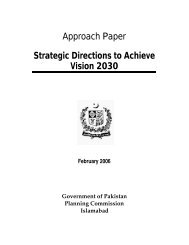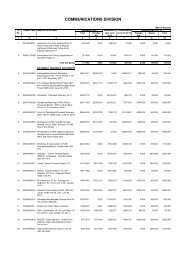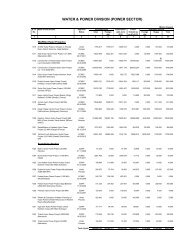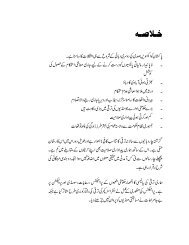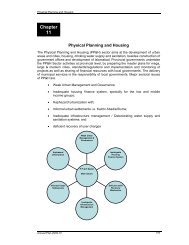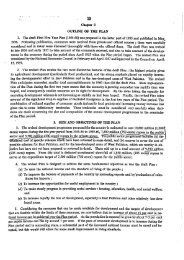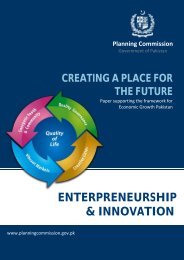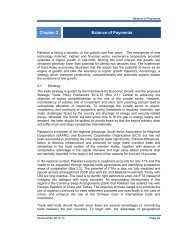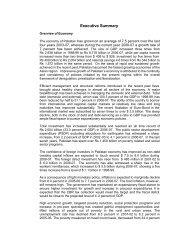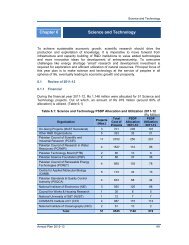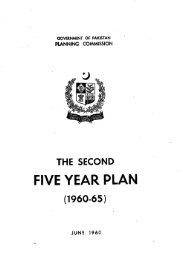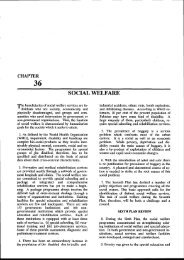Framework for Economic Growth, Pakistan - Planning Commission
Framework for Economic Growth, Pakistan - Planning Commission
Framework for Economic Growth, Pakistan - Planning Commission
Create successful ePaper yourself
Turn your PDF publications into a flip-book with our unique Google optimized e-Paper software.
International conference on “<strong>Framework</strong> <strong>for</strong> <strong>Economic</strong> <strong>Growth</strong>, <strong>Pakistan</strong>”identified all the issues and hindrances.Main issues are covered comprehensivelyand honestly in the document but the realchallenge is the implementation.Question: Do you agree with the four priority areas highlighted in the framework?Answer: The four main areas identified inFEG are important. The issues <strong>Pakistan</strong> isfacing are identified in four priority areas.To go on high growth trajectory would bethe way <strong>for</strong>ward the economy should befocusing on. The intelligent way of going<strong>for</strong>ward is to focus on some of the importantareas instead of looking at all the thingsaltogether.Question: In similarities with Malaysia what would you suggest <strong>for</strong> implementation? And haveyou chalked out Civil Service Re<strong>for</strong>ms <strong>for</strong> your Civil Servants?Answer: In Malaysia the implementationframework was slightly different as weworking closely with the Prime Minister andwe brief him about our analysis and findingswhich he understands. We don't have hungerin our country and unemployment is verylow. We established a Program ManagementOffice as a corporation being run by anindependent council comprising of tenpersons who are economists, socialists,bankers etc. The close relationship betweenthe Prime Minister, the Council, ProgramManagement Office and the Chief Secretary(number one Civil Servant position inMalaysia) were part of the team.Engagement of all the stakeholders from allthe government agencies and stakeholdersfrom private sector was important <strong>for</strong>implementation and ownership. To addressthe whole Civil Service Re<strong>for</strong>m was too bigto address <strong>for</strong> us. We worked on CivilService Re<strong>for</strong>ms with an approach tofacilitate economic plans and trans<strong>for</strong>mationof the country.Question: Do you have incentive structure in monetary terms? Was there a challenge to monetizethe perks in Malaysia?Answer: We proposed incentive structurebased on per<strong>for</strong>mance. All of the perks inMalaysia are monetized. Everything isquantified in incentives which are in practice<strong>for</strong> more than ten years.To monetize, in my point of view, was not aquestion of choice as there were not enoughhousing facilities, cars etc. <strong>for</strong> the CivilServants in our country.The Political will is the main challenge that how government acceptsand willing to support re<strong>for</strong>m initiatives. In case of Malaysia thewhole Cabinet and Prime Minister was with us.Question: Going <strong>for</strong>ward how do you view the challenges <strong>for</strong> <strong>Pakistan</strong>i growth?Answer: The political will is the mainchallenge that how government accepts andwilling to support re<strong>for</strong>m initiatives. In caseof Malaysia the whole Cabinet and PrimeMinister was with us. It requires selling theideas and consultations <strong>for</strong> theimplementation. Crisis gives bothopportunity and challenges. In case of89



